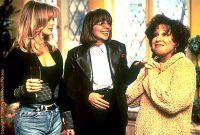'First Wives' Get Even
Trio Triage: Goldie Hawn (left), Diane Keaton and Bette Midler calculate how to cut their losses after getting dumped by their husbands
Goldie Hawn, Diane Keaton and Bette Midler strike back against philandering husbands in new comedy
By Richard von Busack
The title of the new comedy The First Wives Club lets you know where director Hugh Wilson thought it was all headed. The film is full of pastel, winking 1950s advertising art--Frank Tashlin by way of Almodovar. You could do worse for role models. When the movie doesn't take itself seriously, it's a good time. Annie, Brenda, Elise and Cynthia--in flashback--attend college together in 1969. The movie then starts in earnest with Stockard Channing's Cynthia committing suicide in a fur coat, high heels and a nightgown. She's devastated because her husband left her. The three other women, meeting again at the funeral, discuss their own sorrows over drinks and dream up a plan to revenge themselves on the ex-husbands who used them and dropped them.
Bette Midler is an actress I dread. Please don't hit me with another For the Boys or Stella or anything else in which she evinces near-Sinatra levels of self-satisfaction. But when Midler plays the spirit of triumphant feminism unleashed, even Roseanne has nothing on her for pure menace. Here Midler, as Brenda, is funny because she's so downcast. A wicked tongue on an oppressed person is funnier than the put-downs of a star in inflated triumph. Similarly, Goldie Hawn is rich as Elise, a hoarse, pickled old star, demanding lip service from Rob Reiner, in a cameo as her plastic surgeon. Ordering yet more collagen for a mouth already swelled to bursting, she growls, "Fill 'em up!" As for Diane Keaton, well, even her character is named Annie. She is Annie Hall 20 years later: the ultimate urban neurotic. The small parts are also diverting; Sarah Jessica Parker, as the empty-headed mistress of Midler's husband, is a first-rate comedienne, and she even holds her own in a scene with Maggie Smith.
In the last and least third, the three witches turn benign, using the money they've extorted for a do-gooder project. The movie celebrates its solidarity with women with a dinner party, as the charity is unveiled to the sound of celestial chimes on the soundtrack. The First Wives Club hauls out such feminist role models as Ivana Trump and the noted garment-industry tycoon Kathie Lee Gifford--both meant to be examples of women who have it all.
What makes me reserve praise for The First Wives Club is the lack of a strong punch line, since the movie dissolves into a musical number and group hugging. It's even more of a weakness that The First Wives Club never seems to acknowledge the connection between maliciousness in the office and the home. The discarded first wife is uneasy as a figure of sympathy; we're supposed to be surprised that they were treated with the same bottom-line viciousness that typified corporate America at its worst. The first wife is just a domestic example of downsizing, but The First Wives Club naively doesn't make that equation, and the naiveté is reflected in the weakest moments in what's otherwise a tangy and subversive comedy.
[ Metro | Metroactive Central | Archives ]
This page was designed and created by the Boulevards team.

Andy Schwartz
The First Wives Club (PG; 110 min.), directed by Hugh Wilson, written by Robert Harling, based on the novel by Olivia Goldsmith and starring Better Midler, Goldie Hawn and Diane Keaton.
From the September 26-October 2, 1996 issue of Metro
![[Metroactive Movies]](/movies/gifs/ma-movies.gif)